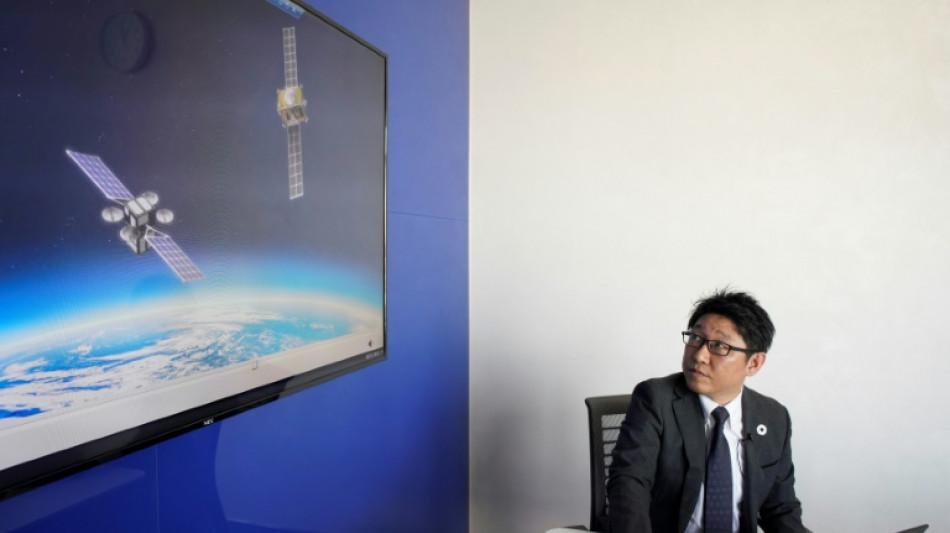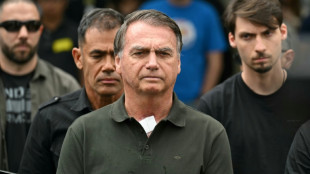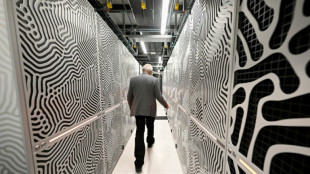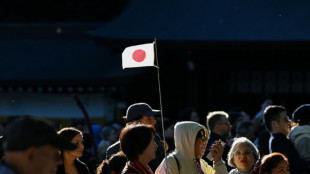
-
 Hansen hat-trick inspires Irish to record win over Australia
Hansen hat-trick inspires Irish to record win over Australia
-
Alcaraz secures ATP Finals showdown with 'favourite' Sinner

-
 UK to cut protections for refugees under asylum 'overhaul': govt
UK to cut protections for refugees under asylum 'overhaul': govt
-
Spain, Switzerland on World Cup brink as Belgium also made to wait

-
 Sweden's Grant leads by one at LPGA Annika tournament
Sweden's Grant leads by one at LPGA Annika tournament
-
Scotland cling to hopes of automatic World Cup qualification despite Greece defeat

-
 Alcaraz secures ATP Finals showdown with great rival Sinner
Alcaraz secures ATP Finals showdown with great rival Sinner
-
England captain Itoje savours 'special' New Zealand win

-
 Wales's Evans denies Japan historic win with last-gasp penalty
Wales's Evans denies Japan historic win with last-gasp penalty
-
Zelensky renews calls for more air defence after deadly strike on Kyiv

-
 NBA's struggling Pelicans sack coach Willie Green
NBA's struggling Pelicans sack coach Willie Green
-
Petain tribute comments raise 'revisionist' storm in France

-
 Spain on World Cup brink as Belgium also made to wait
Spain on World Cup brink as Belgium also made to wait
-
Spain virtually seal World Cup qualification in Georgia romp

-
 M23, DR Congo sign new peace roadmap in Doha
M23, DR Congo sign new peace roadmap in Doha
-
Estevao, Casemiro on target for Brazil in Senegal win

-
 Ford steers England to rare win over New Zealand
Ford steers England to rare win over New Zealand
-
Massive march in Brazil marks first big UN climate protest in years

-
 Spain rescues hundreds of exotic animals from unlicensed shelter
Spain rescues hundreds of exotic animals from unlicensed shelter
-
Huge fire sparked by explosions near Argentine capital 'contained'

-
 South Africa defy early red card to beat battling Italy
South Africa defy early red card to beat battling Italy
-
Sinner beats De Minaur to reach ATP Finals title match

-
 Zelensky vows overhaul of Ukraine's scandal-hit energy firms
Zelensky vows overhaul of Ukraine's scandal-hit energy firms
-
South Africa defy early red card to beat Italy

-
 Alex Marquez claims Valencia MotoGP sprint victory
Alex Marquez claims Valencia MotoGP sprint victory
-
McIlroy shares lead with Race to Dubai title in sight

-
 Climate protesters rally in Brazil at COP30 halfway mark
Climate protesters rally in Brazil at COP30 halfway mark
-
Spike Lee gifts pope Knicks jersey as pontiff meets film stars

-
 BBC caught in crossfire of polarised political and media landscape
BBC caught in crossfire of polarised political and media landscape
-
'Happy' Shiffrin dominates in Levi slalom for 102nd World Cup win

-
 Palestinian national team on 'mission' for peace in Spain visit
Palestinian national team on 'mission' for peace in Spain visit
-
Brazilian 'Superman' cheers child cancer patients in Ghana

-
 India close in on win over South Africa after Jadeja heroics
India close in on win over South Africa after Jadeja heroics
-
Huge explosions rock industrial area near Argentina's capital

-
 Bezzecchi takes pole for Valencia sprint and MotoGP
Bezzecchi takes pole for Valencia sprint and MotoGP
-
Dominant Shiffrin leads after first slalom run in Levi

-
 Nine killed in accidental explosion at Indian Kashmir police station
Nine killed in accidental explosion at Indian Kashmir police station
-
Climate protesters to rally at COP30's halfway mark

-
 Fighting South Africa lose Rickelton after India 189 all out
Fighting South Africa lose Rickelton after India 189 all out
-
Harmer leads South Africa fightback as India 189 all out

-
 Prison looms for Brazil's Bolsonaro after court rejects his appeal
Prison looms for Brazil's Bolsonaro after court rejects his appeal
-
EU bows to pressure on loosening AI, privacy rules

-
 India close in on lead despite South African strikes
India close in on lead despite South African strikes
-
Curry's 49 points propel Warriors in 109-108 win over Spurs

-
 NZ boxer Parker denies taking banned substance after failed test
NZ boxer Parker denies taking banned substance after failed test
-
Australia setback as Hazlewood ruled out of 1st Ashes Test

-
 Australia pace spearhead Josh Hazlewood ruled out of 1st Ashes Test
Australia pace spearhead Josh Hazlewood ruled out of 1st Ashes Test
-
UN Security Council to vote Monday on Trump Gaza plan

-
 Japan's Tomono leads after men's short program at Skate America
Japan's Tomono leads after men's short program at Skate America
-
China tells citizens to avoid Japan travel as Taiwan row grows


Using lasers and 'tow-trucks', Japanese firms target space debris
From laser beams and wooden satellites to galactic tow-truck services, start-ups in Japan are trying to imagine ways to deal with a growing environmental problem: space debris.
Junk like used satellites, parts of rockets and wreckage from collisions has been piling up since the space age began, with the problem accelerating in recent decades.
"We're entering an era when many satellites will be launched one after another. Space will become more and more crowded," said Miki Ito, general manager at Astroscale, a company dedicated to "space sustainability".
"There are simulations suggesting space won't be usable if we go on like this," she told AFP. "So we must improve the celestial environment before it's too late."
The European Space Agency (ESA) estimates that around one million pieces of debris larger than a centimetre -- big enough to "disable a spacecraft" -- are in Earth's orbit.
They are already causing problems, from a near-miss in January involving a Chinese satellite, to a five-millimetre hole knocked into a robotic arm on the International Space Station last year.
"It's hard to predict exactly how fast the amount of space debris will increase," said Toru Yamamoto, a senior researcher at the Japan Aerospace Exploration Agency (JAXA).
But "it's an issue that raises real concerns about the sustainable use of space."
With satellites now crucial for GPS, broadband and banking data, collisions pose significant risks on Earth.
Tadanori Fukushima has seen the scale of the problem in his job as an engineer with Tokyo-based satellite operator and broadcaster SKY Perfect JSAT.
"A stationary satellite would get roughly 100 'debris-approaching' alerts a year," he told AFP.
International "satellite disposal guidelines" include rules like moving used satellites to "graveyard orbit" -- but the increase in debris means more is needed, specialists say.
- 'No panacea' -
Fukushima launched an in-house start-up in 2018 and envisions using a laser beam to vaporise the surface of space debris, creating a pulse of energy that pushes the object into a new orbit.
The irradiating laser means there's no need to touch any debris, which is generally said to move about 7.5 kilometres per second -- much faster than a bullet.
For now, the project is experimental, but Fukushima hopes to test the idea in space by spring 2025, working with several research institutions.
Japanese firms, along with some in Europe and the United States, are leading the way on developing solutions, according to Fukushima.
Some projects are further along, including Astroscale's space "tow-truck", which uses a magnet to collect out-of-service satellites.
"If a car breaks down, you call a tow-truck service. If a satellite breaks down and stays there, it faces the risk of collision with debris and needs to be collected quickly," Ito explained.
The firm carried out a successful trial last year and imagines one day equipping customer satellites with a "docking plate" equivalent to a tow-truck's hook, allowing collection later on.
Astroscale, which has a contract with the ESA, plans a second test by the end of 2024 and hopes to launch its service soon after.
Other efforts approach the problem at the source, by creating satellites that don't produce debris.
Kyoto University and Sumitomo Forestry envisage a wooden satellite that goes into orbit in a rocket and burns up safely when it plunges to Earth.
That project is also in its infancy -- in March, pieces of wood were sent to the International Space Station to test how they respond to cosmic rays.
Space agencies have their own programmes, with JAXA focusing on large debris over three tonnes.
And internationally, firms including US-based Orbit Fab and Australia's Neumann Space have proposed ideas such as in-orbit refuelling to extend the life of satellites.
The problem is complex enough that a range of solutions will be needed, said JAXA's Yamamoto.
"There is no panacea."
F.AbuZaid--SF-PST




